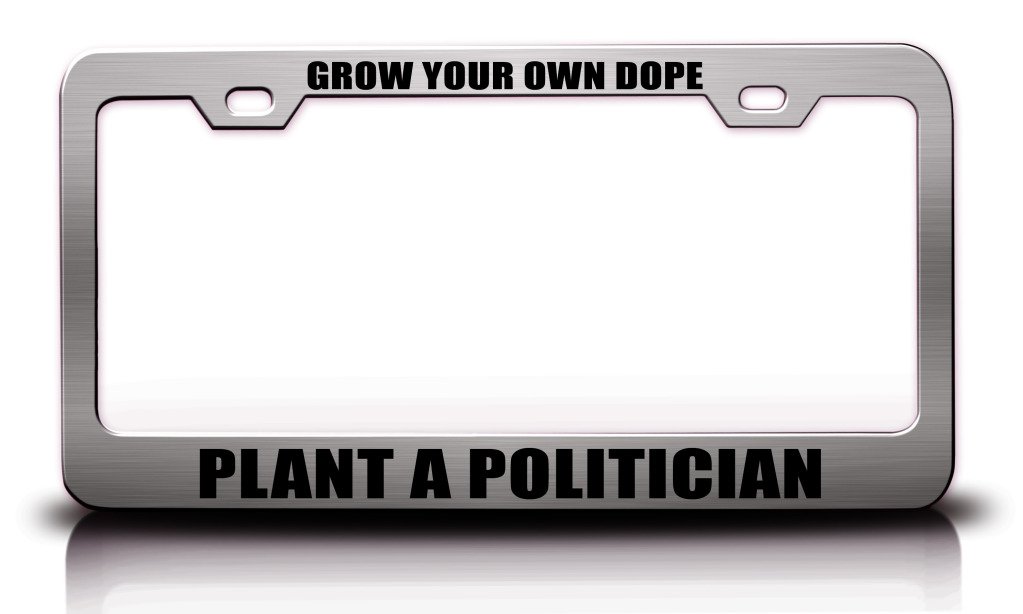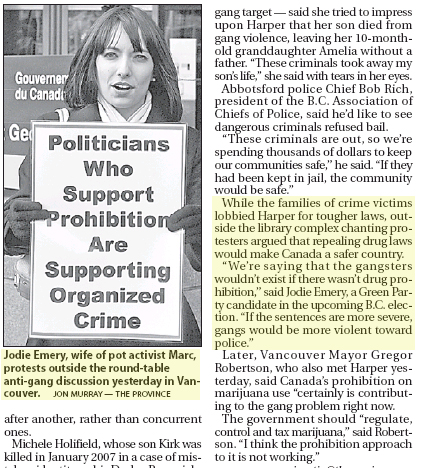smokum
I am who I am and your approval isn't needed!
http://news.ca.msn.com/canada/dollar13b-medical-marijuana-free-market-coming-to-canada
The Conservative government is launching a $1.3-billion free market in medical marijuana on Tuesday, eventually providing an expected 450,000 Canadians with quality weed.
Health Canada is phasing out an older system on Monday that mostly relied on small-scale, homegrown medical marijuana of varying quality, often diverted illegally to the black market.
In its place, large indoor marijuana farms certified by the RCMP and health inspectors will produce, package and distribute a range of standardized weed, all of it sold for whatever price the market will bear. The first sales are expected in the next few weeks, delivered directly by secure courier.
"We're fairly confident that we'll have a healthy commercial industry in time," Sophie Galarneau, a senior official with the department, said in an interview.
"It's a whole other ball game."
The sanctioned birth of large-scale, free-market marijuana production comes as the Conservatives pillory Liberal Leader Justin Trudeau's campaign to legalize recreational marijuana.
- Justin Trudeau's pot admission could show loosening taboo
-
Justin Trudeau's pot stance sparks sharp words from Harper
Health Canada is placing no limits on the number of these new capital-intensive facilities, which will have mandatory vaults and security systems. Private-dwelling production will be banned. Imports from places such as the Netherlands will be allowed.
Already 156 firms have applied for lucrative producer and distributor status since June, with the first two receiving licences just last week.
'Enormous' potential profit
The old system fostered only a cottage industry, with 4,200 growers licensed to produce for a maximum of two patients each. The Mounties have complained repeatedly these grow-ops were often a front for criminal organizations.
The next six months are a transition period, as Health Canada phases out the old system by March 31, while encouraging medical marijuana users to register under the replacement regime and to start buying from the new factory-farms.
There are currently 37,400 medical marijuana users recognized by the department, but officials project that number will swell more than 10-fold, to as many as 450,000 people, by 2024.
The profit potential is enormous. A gram of dried marijuana bud on the street sells for about $10 and Health Canada projects the legal stuff will average about $7.60 next year, as producers set prices without interference from government.
Chuck Rifici of Tweed Inc. has applied for a licence to produce medical weed in an abandoned Hershey chocolate factory in hard-scrabble Smiths Falls, Ont.
Rifici, who is also a senior adviser to Trudeau, was cited in a Conservative cabinet minister's news release Friday that said the Liberals plan to "push pot," with no reference to Health Canada's own encouragement of marijuana entrepreneurs.
Rifici says he's trying to help a struggling community by providing jobs while giving suffering patients a quality product.
"There's a real need," he said in an interview. "You see what this medicine does to them."
Revenue to hit $1.3 billion
Tweed Inc. proposes to produce at least 20 strains to start, and will reserve 10 per cent of production for compassionate, low-cost prescriptions for impoverished patients, he says.
Patients often use several grams a day to alleviate a wide range of symptoms, including cancer-related pain and nausea. They'll no longer be allowed to grow it for themselves under the new rules.
Revenues for the burgeoning new industry are expected to hit $1.3 billion a year by 2024, according to federal projections. And operators would be favourably positioned were marijuana ever legalized for recreational use, as it has been in two American states.
Eric Nash of Island Harvest in Duncan, B.C., has applied for one of the new licences, banking on his experience as a licensed grower since 2002 in the current system.
"The opportunity in the industry is significant," he said in an interview.
"We'll see a lot of moving and shaking within the industry, with companies positioning. And I think we'll see some mergers and acquisitions, strategic alliances formed."
"It'll definitely yield benefits to the consumers and certainly for the economy and society in general."
Competition to keep prices in check
Veterans Affairs Canada currently pays for medical marijuana for some patients, even though the product lacks official drug status. Some provinces are also being pressed to cover costs, as many users are too sick to work and rely on welfare.
Health Canada currently sells medical marijuana, produced on contract by Prairie Plant Systems, for $5 a gram, and acknowledges the new system will be more expensive for patients.
But Galarneau says competition will help keep prices in check.
"We expect that over time, prices will be driven down by the free market," she said. "The lower price range will likely be around $3 a gram. ... It's hard to predict."
Saskatoon-based Prairie Plant Systems, and its subsidiary CanniMed Ltd., were granted the first two licences under the system and are already advertising their new products on the web.
Prospective patients, including those under the current system, must get a medical professional to prescribe medical marijuana using a government-approved form.
Health Canada only reluctantly established its medical marijuana program, driven by court decisions from 2001 forward that supported the rights of suffering patients, even as medical science has been slow to verify efficacy.
The Conservative government is launching a $1.3-billion free market in medical marijuana on Tuesday, eventually providing an expected 450,000 Canadians with quality weed.
Health Canada is phasing out an older system on Monday that mostly relied on small-scale, homegrown medical marijuana of varying quality, often diverted illegally to the black market.
In its place, large indoor marijuana farms certified by the RCMP and health inspectors will produce, package and distribute a range of standardized weed, all of it sold for whatever price the market will bear. The first sales are expected in the next few weeks, delivered directly by secure courier.
"We're fairly confident that we'll have a healthy commercial industry in time," Sophie Galarneau, a senior official with the department, said in an interview.
"It's a whole other ball game."
The sanctioned birth of large-scale, free-market marijuana production comes as the Conservatives pillory Liberal Leader Justin Trudeau's campaign to legalize recreational marijuana.
- Justin Trudeau's pot admission could show loosening taboo
-
Justin Trudeau's pot stance sparks sharp words from Harper
Health Canada is placing no limits on the number of these new capital-intensive facilities, which will have mandatory vaults and security systems. Private-dwelling production will be banned. Imports from places such as the Netherlands will be allowed.
Already 156 firms have applied for lucrative producer and distributor status since June, with the first two receiving licences just last week.
'Enormous' potential profit
The old system fostered only a cottage industry, with 4,200 growers licensed to produce for a maximum of two patients each. The Mounties have complained repeatedly these grow-ops were often a front for criminal organizations.
The next six months are a transition period, as Health Canada phases out the old system by March 31, while encouraging medical marijuana users to register under the replacement regime and to start buying from the new factory-farms.
There are currently 37,400 medical marijuana users recognized by the department, but officials project that number will swell more than 10-fold, to as many as 450,000 people, by 2024.
The profit potential is enormous. A gram of dried marijuana bud on the street sells for about $10 and Health Canada projects the legal stuff will average about $7.60 next year, as producers set prices without interference from government.
Chuck Rifici of Tweed Inc. has applied for a licence to produce medical weed in an abandoned Hershey chocolate factory in hard-scrabble Smiths Falls, Ont.
Rifici, who is also a senior adviser to Trudeau, was cited in a Conservative cabinet minister's news release Friday that said the Liberals plan to "push pot," with no reference to Health Canada's own encouragement of marijuana entrepreneurs.
Rifici says he's trying to help a struggling community by providing jobs while giving suffering patients a quality product.
"There's a real need," he said in an interview. "You see what this medicine does to them."
Revenue to hit $1.3 billion
Tweed Inc. proposes to produce at least 20 strains to start, and will reserve 10 per cent of production for compassionate, low-cost prescriptions for impoverished patients, he says.
Patients often use several grams a day to alleviate a wide range of symptoms, including cancer-related pain and nausea. They'll no longer be allowed to grow it for themselves under the new rules.
Revenues for the burgeoning new industry are expected to hit $1.3 billion a year by 2024, according to federal projections. And operators would be favourably positioned were marijuana ever legalized for recreational use, as it has been in two American states.
Eric Nash of Island Harvest in Duncan, B.C., has applied for one of the new licences, banking on his experience as a licensed grower since 2002 in the current system.
"The opportunity in the industry is significant," he said in an interview.
"We'll see a lot of moving and shaking within the industry, with companies positioning. And I think we'll see some mergers and acquisitions, strategic alliances formed."
"It'll definitely yield benefits to the consumers and certainly for the economy and society in general."
Competition to keep prices in check
Veterans Affairs Canada currently pays for medical marijuana for some patients, even though the product lacks official drug status. Some provinces are also being pressed to cover costs, as many users are too sick to work and rely on welfare.
Health Canada currently sells medical marijuana, produced on contract by Prairie Plant Systems, for $5 a gram, and acknowledges the new system will be more expensive for patients.
But Galarneau says competition will help keep prices in check.
"We expect that over time, prices will be driven down by the free market," she said. "The lower price range will likely be around $3 a gram. ... It's hard to predict."
Saskatoon-based Prairie Plant Systems, and its subsidiary CanniMed Ltd., were granted the first two licences under the system and are already advertising their new products on the web.
Prospective patients, including those under the current system, must get a medical professional to prescribe medical marijuana using a government-approved form.
Health Canada only reluctantly established its medical marijuana program, driven by court decisions from 2001 forward that supported the rights of suffering patients, even as medical science has been slow to verify efficacy.










